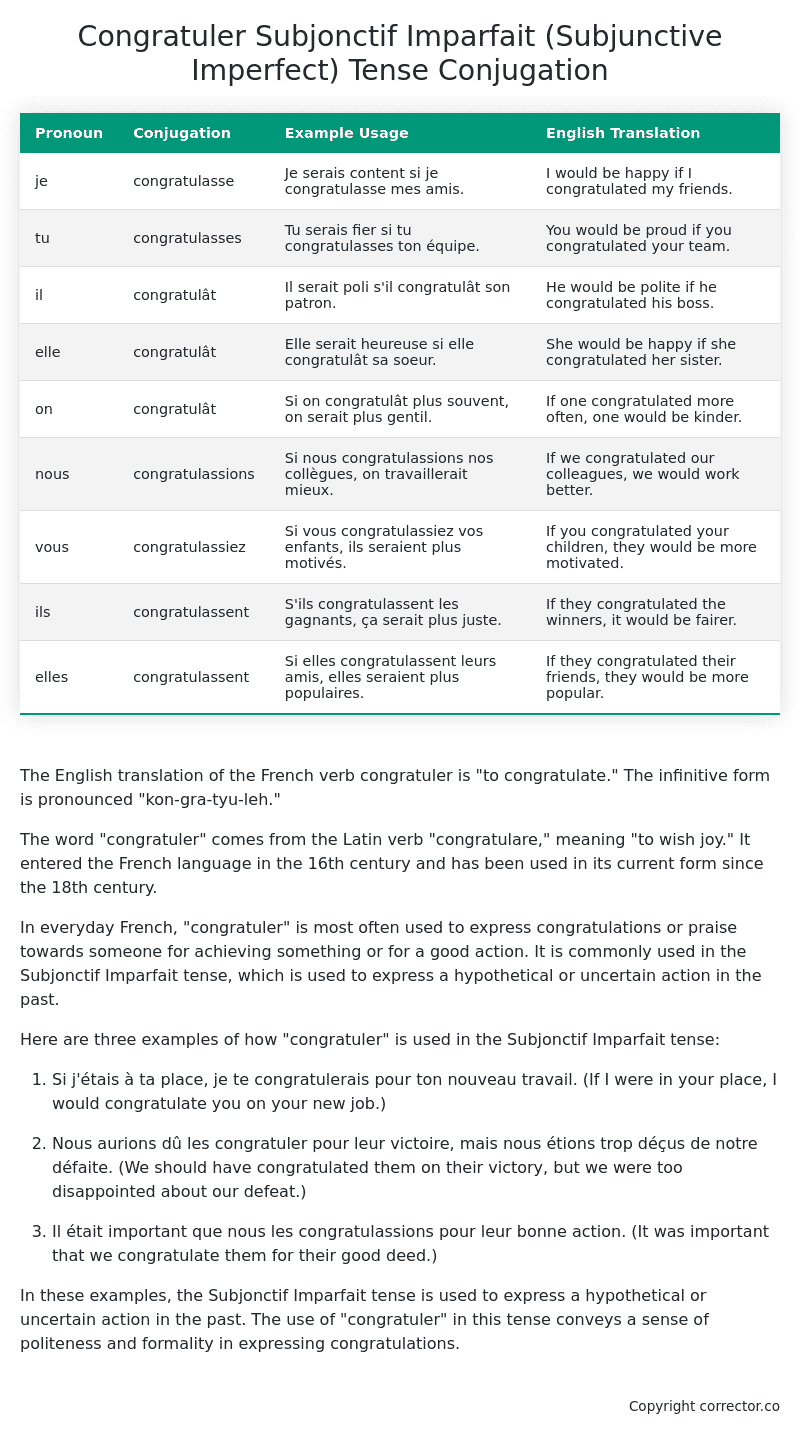Subjonctif Imparfait (Subjunctive Imperfect) Tense Conjugation of the French Verb congratuler
Introduction to the verb congratuler
The English translation of the French verb congratuler is “to congratulate.” The infinitive form is pronounced “kon-gra-tyu-leh.”
The word “congratuler” comes from the Latin verb “congratulare,” meaning “to wish joy.” It entered the French language in the 16th century and has been used in its current form since the 18th century.
In everyday French, “congratuler” is most often used to express congratulations or praise towards someone for achieving something or for a good action. It is commonly used in the Subjonctif Imparfait tense, which is used to express a hypothetical or uncertain action in the past.
Here are three examples of how “congratuler” is used in the Subjonctif Imparfait tense:
-
Si j’étais à ta place, je te congratulerais pour ton nouveau travail. (If I were in your place, I would congratulate you on your new job.)
-
Nous aurions dû les congratuler pour leur victoire, mais nous étions trop déçus de notre défaite. (We should have congratulated them on their victory, but we were too disappointed about our defeat.)
-
Il était important que nous les congratulassions pour leur bonne action. (It was important that we congratulate them for their good deed.)
In these examples, the Subjonctif Imparfait tense is used to express a hypothetical or uncertain action in the past. The use of “congratuler” in this tense conveys a sense of politeness and formality in expressing congratulations.
Table of the Subjonctif Imparfait (Subjunctive Imperfect) Tense Conjugation of congratuler
| Pronoun | Conjugation | Example Usage | English Translation |
|---|---|---|---|
| je | congratulasse | Je serais content si je congratulasse mes amis. | I would be happy if I congratulated my friends. |
| tu | congratulasses | Tu serais fier si tu congratulasses ton équipe. | You would be proud if you congratulated your team. |
| il | congratulât | Il serait poli s’il congratulât son patron. | He would be polite if he congratulated his boss. |
| elle | congratulât | Elle serait heureuse si elle congratulât sa soeur. | She would be happy if she congratulated her sister. |
| on | congratulât | Si on congratulât plus souvent, on serait plus gentil. | If one congratulated more often, one would be kinder. |
| nous | congratulassions | Si nous congratulassions nos collègues, on travaillerait mieux. | If we congratulated our colleagues, we would work better. |
| vous | congratulassiez | Si vous congratulassiez vos enfants, ils seraient plus motivés. | If you congratulated your children, they would be more motivated. |
| ils | congratulassent | S’ils congratulassent les gagnants, ça serait plus juste. | If they congratulated the winners, it would be fairer. |
| elles | congratulassent | Si elles congratulassent leurs amis, elles seraient plus populaires. | If they congratulated their friends, they would be more popular. |
Other Conjugations for Congratuler.
Le Present (Present Tense) Conjugation of the French Verb congratuler
Imparfait (Imperfect) Tense Conjugation of the French Verb congratuler
Passé Simple (Simple Past) Tense Conjugation of the French Verb congratuler
Passé Composé (Present Perfect) Tense Conjugation of the French Verb congratuler
Futur Simple (Simple Future) Tense Conjugation of the French Verb congratuler
Futur Proche (Near Future) Tense Conjugation of the French Verb congratuler
Plus-que-parfait (Pluperfect) Tense Conjugation of the French Verb congratuler
Passé Antérieur (Past Anterior) Tense Conjugation of the French Verb congratuler
Futur Antérieur (Future Anterior) Tense Conjugation of the French Verb congratuler
Subjonctif Présent (Subjunctive Present) Tense Conjugation of the French Verb congratuler
Subjonctif Passé (Subjunctive Past) Tense Conjugation of the French Verb congratuler
Subjonctif Imparfait (Subjunctive Imperfect) Tense Conjugation of the French Verb congratuler (this article)
Conditionnel Présent (Conditional Present) Tense Conjugation of the French Verb congratuler
Conditionnel Passé (Conditional Past) Tense Conjugation of the French Verb congratuler
L’impératif Présent (Imperative Present) Tense Conjugation of the French Verb congratuler
L’infinitif Présent (Infinitive Present) Tense Conjugation of the French Verb congratuler
Struggling with French verbs or the language in general? Why not use our free French Grammar Checker – no registration required!
Get a FREE Download Study Sheet of this Conjugation 🔥
Simply right click the image below, click “save image” and get your free reference for the congratuler Subjonctif Imparfait tense conjugation!

Congratuler – About the French Subjonctif Imparfait (Subjunctive Imperfect) Tense
Formation
Common Everyday Usage Patterns
Interactions with Other Tenses
Subjonctif Présent
Indicatif Passé Composé
Conditional
Conditional Perfect
Summary
I hope you enjoyed this article on the verb congratuler. Still in a learning mood? Check out another TOTALLY random French verb conjugation!


